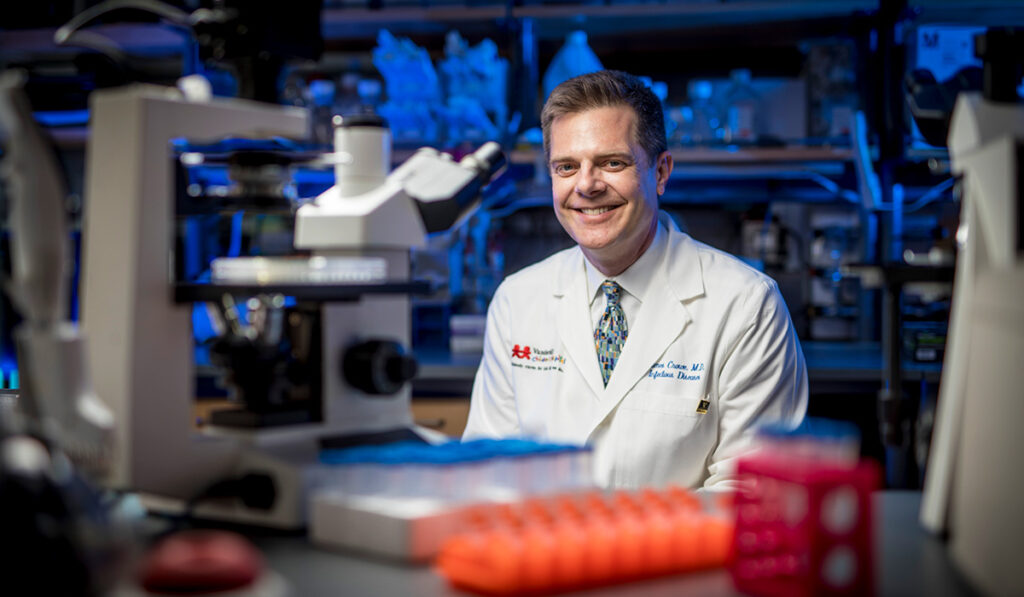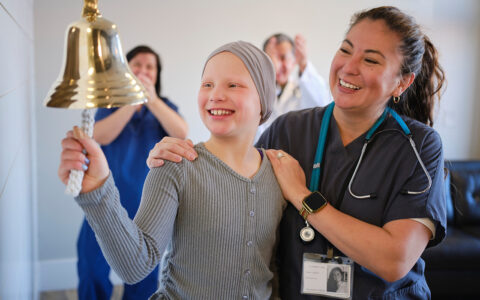James Crowe, M.D. is no stranger to a pandemic. As director of the Vanderbilt Vaccine Center, he’s been on the frontlines of threats from Zika, HIV, influenza, Ebola, respiratory syncytial virus (RSV), SARS-CoV-2 and more.
Among his other accomplishments, Crowe and his team pioneered the use of monoclonal antibodies to neutralize viral infections and helped develop multiple candidate vaccines tested in humans.
Now, with RSV infections spiking in the United States, Crowe’s work, insights and skills are addressing the challenge and looking to extend the process into drug development.
Over the past decade, Crowe and his colleagues have discovered that the key protein on the surface of RSV that promotes immunogenicity is its fusion protein. Further crystallography by his group shows exactly how monoclonal antibodies might neutralize proteins from RSV and other viruses. Each is a critical step in drug development.
“The general strategy is to have a portfolio of antibodies that can cover multiple viruses,” Crowe said. “For RSV, we have found some rare, preventative antibodies that are also effective against a similar virus that causes pneumonia in children called metapneumovirus.”
Central Player in Global Fight
To move the antibodies into development, Crowe draws from his experience with SARS-CoV-2.
At the peak of the COVID-19 pandemic, the Vanderbilt Vaccine Center served as a major hub for prophylaxis development through the federal Pandemic Prevention Platform (P3) program. Under Crowe’s leadership, large panels of monoclonal antibodies were rapidly isolated. Two were ultimately selected by AstraZeneca, progressed to phase 3 trials, and then were authorized by the FDA for emergency use.
Crowe earned significant recognition for his COVID-19 work, including the Best Invention of 2022 award from TIME magazine, a 2022 Harrington Prize, a Building the Foundation Award from Research!America and a Golden Goose Award from the American Association for the Advancement of Science.
“We’re grateful to all of the supporting societies and institutions who are getting the word out that federal funding for basic science has an enormous return on investment,” Crowe said.
Drug Discovery Potential in Academia
The Vanderbilt team has completed the discovery, basic science, crystallography, and animal testing for RSV-metapneumovirus antibodies, but “that’s just the beginning,” the researcher said.
“Turning antibodies into products is a whole different type of science,” Crowe added. “It’s more expensive, and involves manufacturing, formulation and delivery. Universities are typically not skilled in that.”
To overcome this hurdle, Crowe and his team have added “developability” studies to their workflow. These studies address manufacturers’ concerns by providing test results for factors like antibody stability and production feasibility.
“That way, when we turn to a company, we’ve ‘de-risked’ the antibody. It’s not traditional for academics to do that,” Crowe said, adding, “If we want to move academic discoveries to the clinic, we need to learn how to partner well with companies. In our experience most companies welcome the effort and will come halfway toward us with more confidence in licensing our products.”
“If we want to move academic discoveries to the clinic, we need to learn how to partner well with companies.”
Top-tier academic medical centers may be spurred to launch startup companies to promote a potential therapeutic at a level that can compete with those in the private sector.
“Wherever you see venture capital, you see universities spinning out startup companies,” said Crowe, who himself helped launch IDBiologics in 2017.
In the case of RSV, investors must determine whether there is a viable business model in the new antibody, given that there are existing therapeutics on the market and some in the pipeline – even one with dual-disease coverage.
Burden of Childhood Disease
Still, Crowe remains committed to fueling interest in infectious disease research by any means necessary, whether delivering a TEDx Talk, appearing on a podcast, overseeing multiple robust social media accounts, connecting with university multimedia, or giving a comment to the local news.
He recalls becoming impassioned about childhood infectious diseases after an unforgettable experience as a young medical student in a rural hospital in East Africa. There, Crowe witnessed firsthand the impact of staggering childhood mortality, particularly the pain it leaves in its wake. He remembers one child who arrived at the hospital too late – already a victim of an infection.
“That mother let out a wail that filled the entire room and the soul of everyone who was there,” Crowe said. “I can’t forget that moment.”
Afterward, he began researching in earnest what he describes as “an overwhelming burden of infectious diseases among children.”
Toward RSV Infection Prevention
Of childhood infectious diseases today, RSV is perhaps the most prevalent.
“By the age of 1 year, 60-70 percent of children have been infected by RSV [2-3 percent of whom are hospitalized] and almost all children are infected by two years,” Crowe and colleagues wrote in one review of the RSV landscape.
Beyond their own work, Crowe and his laboratory colleagues describe 33 RSV prevention candidates currently in clinical development. Nine of these are completing phase 3 trials.
Crowe anticipates FDA approval within a year for a new extended half-life monoclonal antibody from AstraZeneca solely to treat RSV in infants.
None of this could have been possible without the diligence of basic science researchers, Crowe says, including those at the Vanderbilt Vaccine Center. His team continues to publish foundational studies regarding viral and immunogenic mechanisms that drive antibody drug development for infectious diseases.
Crowe’s mounting accolades now include University Distinguished Professor, a title he bears both in his roles as professor of pediatrics and chemistry at Vanderbilt.






